Create and Certify Your Own Wildlife Habitat
Gardening for wildlife is fun, inexpensive, and an easy way to make a lasting impact for wildlife.
Tennessee Wildlife Federation is committed to wildlife habitat conservation, big and small. So, we’ve partnered with National Wildlife Federation (NWF) to help you create a wildlife haven in your own yard—whether you have a rolling rural property, a tiny urban lot, or a container garden on your balcony.
But you don’t have to stop at home. You can even take on certifying your school, your church, or even your entire community—just like Knoxville did.
After all, 90 percent of Tennessee’s land is in private hands. That means providing the basics for our diverse wildlife is up to you!
Every Certified Wildlife Habitat provides wildlife the essentials

Food

Water

Cover

Places to raise young

Sustainable practices
Food


Water
Cover


Places to raise young
Wildlife needs resources to reproduce as well as to protect and nourish their young. To certify, your habitat needs at least two places wildlife can raise young, such as a nesting box, mature trees, or a thicket.
Sustainable Practices

Meet Tony
 With the help of Tony Lance, our resident naturalist, ornithologist and gardening guru, you can put your commitment to conservation in action. When we each do our part, we can keep Tennessee the most biologically diverse inland state in the country.
With the help of Tony Lance, our resident naturalist, ornithologist and gardening guru, you can put your commitment to conservation in action. When we each do our part, we can keep Tennessee the most biologically diverse inland state in the country.
The application processing fee is just $20 and you’ll receive a certificate to designate your newly Certified Wildlife Habitat. You’ll also receive exclusive NWF member benefits while supporting conservation statewide.
Have questions about certifying your wildlife habitat? Send him a message!
Learn more
Tennessee General Assembly Session Begins 2022
The 112th Tennessee General Assembly reconvened on January 11, 2022. With the deadline for filing new bills on February 3, the Federation is tracking and prioritizing more than fifty pieces of legislation.
The Little Brown Bat with Big Problems
Populations of the little brown bat in Tennessee have taken such a hit in the last few decades that the little brown bat has been designated as a species of greatest conservation need. Recovering America’s Wildlife Act can help these bats and other endangered species.
Swimming for Survival: Meet the Endangered Minnow Found Only in a Few Tennessee Streams
Laurel dace (Chrosomus saylori) have historically been known to be found in a limited number of streams on the Cumberland Plateau. This makes it incredibly rare and unique to Tennessee.



